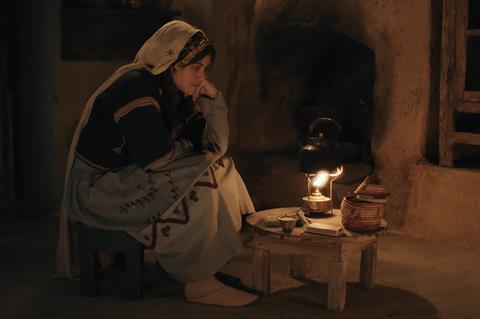
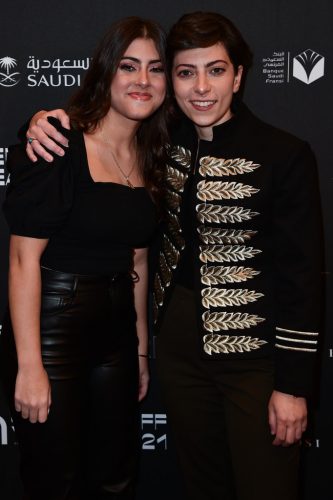
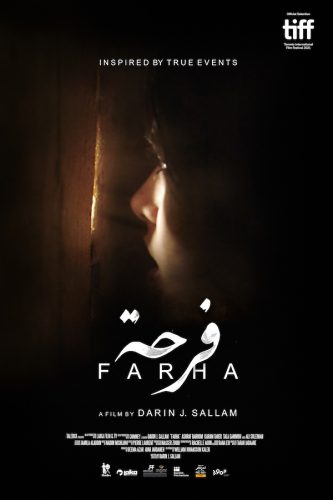
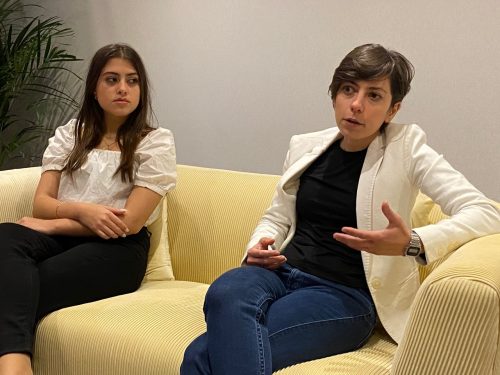
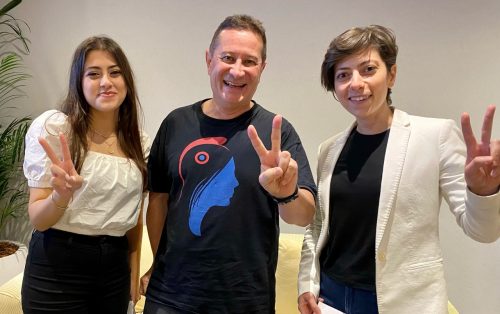
With director Darin J. Sallam and actress Karam Taher
How can one not be touched by directorial tour- de- force from Darin J. Sallam: ‘FARHA’ . This is the touching journey of a 14 year old girl, Farha, played by newcomer Karam Taher, in 1948 in Palestine and who is watching her world fall into chaos. This was one more daring movie programmed by The Red Sea Film Festival. Listen to the tales of Darin and Karam. Open your heart and your mind and let yourself transported…
Q: Tell us about the choice to bring forth this story?
Darin: This is a story I stumbled upon a long time ago and it stayed with me. I had therefore the urge to bring it to the screen. I have this claustrophobia and when I heard this story I even more related to this character and what she is going through. She is locked in a pantry and she is watching from there what’s going to happen to her home. I could only feel about what she was feeling inside this room. I really had so much compassion for her. When I make a film it’s crucial for me to relate to the character in the heart of the story. I also liked the challenge to film this picture inside of a room. At first, I wanted to make the entire movie in the room, but I realized that for people to relate I needed to take about the place, about what’s going on outside the room. This helps us understand her loss. Loss is an essential theme in my film. When she leaves the room it’s symbolic, it’s like a liberation. So, we needed to see the loss of her friends, her father, her dream. The loss is at the heart of her journey.
Q: Were influenced by and did you look at “The Diary of Anne Frank”?
Darin: It’s funny because, indeed, a few people made some comparison to Anne Frank. I didn’t think about it when I made the movie, but I can understand why people thought about the horrible story of Anne Frank. My character is going through a similar horrible journey.
Q: Do you think that with so many Arab women making films, right now, and here programmed at the Red Sea Film Festival, that there is a wave of changes happening?
Darin: Yes, in a way. But I think that they are both men and women creating this change. For sure, as a woman, I try to make films about women. Where I come from, Jordan, most of the producers are now women. We don’t have yet too many women directors but it’s changing. Overall, more than 50% of the crew in Jordan are women. Especially all the heads of various key departments: sound designer, costumes, make-up, etc.
Q: Do you think there is a political message in your movie, about women in Palestine?
Darin: I think that every film is political. Even a love story is political. For me, Farha, is not about politics but it’s a close-up about this girl is in transition, how she changes through these events and how she is becoming a woman. It’s a coming-of-age story for me. For me this is what matters. The war and everything else are just in the background. It could really happen anywhere in the world if you think about it.
Q: Tell us about casting and finding Karam Taher to play Farha.
Darin: I knew from the beginning this was not going to be an easy task to find the right actress to play Farha. Especially because we don’t have a choice of young actress, not only in Jordan but in the entire region. I knew I had to find a new face. I love working with young actresses and training them. It took me almost a year and a half to find Karam. I saw so many girls, maybe 200. Karam gets jealous when I talk about this, Haha! Most of the young girls I met didn’t know about Palestine 1948. But when I met Karam she told me she knew about it from her grand- mother. So, I felt she had the right background to become this character. Even so she was shy at the audition there was a charismatic presence, especially in her eyes. Also, when I gave her a Palestinian dress she embodied truly her role, I knew I had found the perfect Farha. She has something genuine and real and this is perfect to play this young girl. I worked with her in a different way: how to not act, to stay real.
Karam: It was a great experience and Darin made me feel so comfortable about myself even so, I don’t have much experience. I had a learn an accent for this film because Farha speaks a specific Arabic dialect. But Darin was very helpful, and I managed to get through this challenge.
Q: How important was it for you to talk about Palestine in 1948? How does it impact Palestine today?
Darin: For me it’s very important. Most movies talking about Palestine talk about Palestine now or Palestine in 1967. 1948 is a key moment and it’s rarely talked about. I think these events changed the Palestinian lives, the Arab world and the World in its globality. It’s called the Nakba. It is the first war of the Israeli-Palestinian conflict. 700,000 Palestinians Arabs fled or were expelled from their homes. Until today we are still suffering from what happened in 1948. This is crucial for me to explain this moment in history that changed everything. It’s the source of the current conflict.
Q: Ultimately, what is the impact you hope this film create? What messages should we get from watching ‘Farha’?
Darin: I already saw the impact of my film when I screened it at the Toronto film festival last September. People were so surprised to learn about the events of 1948 and they had no idea about the consequences of the Nakba. They always hear the Israeli side of 1948 but not the Palestinian side. Most young people today don’t know about the source of the conflict between Palestine and Israel. It is very important to tell them the truth and explain them what happened. It’s an eye opened experience for the youth of today. Also, I hope people get in the shoes of Farha and feel her pain, feel her loss, and to have compassion. To me, Farha represents Palestine and its suffering.
Karam: For me it’s important that my generation learn about this war, the origin of this perpetual conflict between Palestine and Israel. I hope this film affect lost of people when they will discover it.
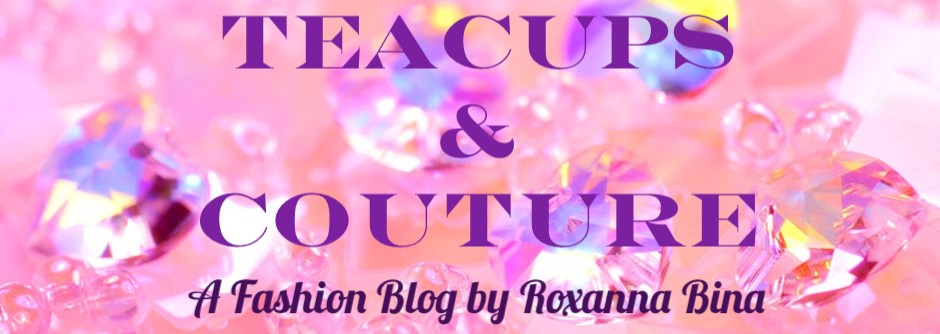 Teacups & Couture A Fashion Blog by Roxanna Bina
Teacups & Couture A Fashion Blog by Roxanna Bina


